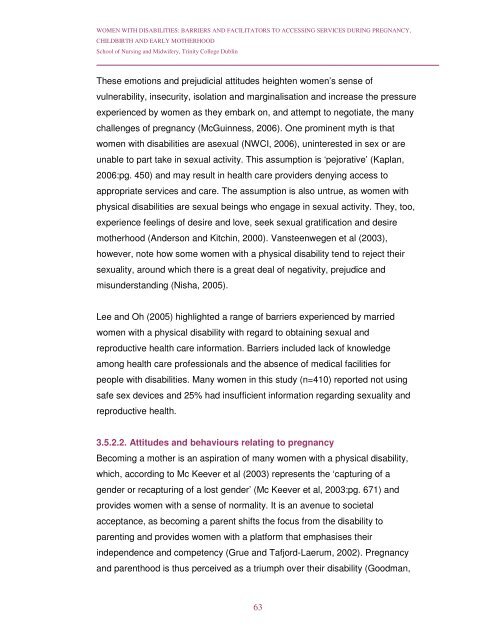Women with Disabilities: Barriers and Facilitators to Accessing ...
Women with Disabilities: Barriers and Facilitators to Accessing ...
Women with Disabilities: Barriers and Facilitators to Accessing ...
You also want an ePaper? Increase the reach of your titles
YUMPU automatically turns print PDFs into web optimized ePapers that Google loves.
WOMEN WITH DISABILITIES: BARRIERS AND FACILITATORS TO ACCESSING SERVICES DURING PREGNANCY,CHILDBIRTH AND EARLY MOTHERHOODSchool of Nursing <strong>and</strong> Midwifery, Trinity College DublinThese emotions <strong>and</strong> prejudicial attitudes heighten women’s sense ofvulnerability, insecurity, isolation <strong>and</strong> marginalisation <strong>and</strong> increase the pressureexperienced by women as they embark on, <strong>and</strong> attempt <strong>to</strong> negotiate, the manychallenges of pregnancy (McGuinness, 2006). One prominent myth is thatwomen <strong>with</strong> disabilities are asexual (NWCI, 2006), uninterested in sex or areunable <strong>to</strong> part take in sexual activity. This assumption is ‘pejorative’ (Kaplan,2006:pg. 450) <strong>and</strong> may result in health care providers denying access <strong>to</strong>appropriate services <strong>and</strong> care. The assumption is also untrue, as women <strong>with</strong>physical disabilities are sexual beings who engage in sexual activity. They, <strong>to</strong>o,experience feelings of desire <strong>and</strong> love, seek sexual gratification <strong>and</strong> desiremotherhood (Anderson <strong>and</strong> Kitchin, 2000). Vansteenwegen et al (2003),however, note how some women <strong>with</strong> a physical disability tend <strong>to</strong> reject theirsexuality, around which there is a great deal of negativity, prejudice <strong>and</strong>misunderst<strong>and</strong>ing (Nisha, 2005).Lee <strong>and</strong> Oh (2005) highlighted a range of barriers experienced by marriedwomen <strong>with</strong> a physical disability <strong>with</strong> regard <strong>to</strong> obtaining sexual <strong>and</strong>reproductive health care information. <strong>Barriers</strong> included lack of knowledgeamong health care professionals <strong>and</strong> the absence of medical facilities forpeople <strong>with</strong> disabilities. Many women in this study (n=410) reported not usingsafe sex devices <strong>and</strong> 25% had insufficient information regarding sexuality <strong>and</strong>reproductive health.3.5.2.2. Attitudes <strong>and</strong> behaviours relating <strong>to</strong> pregnancyBecoming a mother is an aspiration of many women <strong>with</strong> a physical disability,which, according <strong>to</strong> Mc Keever et al (2003) represents the ‘capturing of agender or recapturing of a lost gender’ (Mc Keever et al, 2003:pg. 671) <strong>and</strong>provides women <strong>with</strong> a sense of normality. It is an avenue <strong>to</strong> societalacceptance, as becoming a parent shifts the focus from the disability <strong>to</strong>parenting <strong>and</strong> provides women <strong>with</strong> a platform that emphasises theirindependence <strong>and</strong> competency (Grue <strong>and</strong> Tafjord-Laerum, 2002). Pregnancy<strong>and</strong> parenthood is thus perceived as a triumph over their disability (Goodman,63
















